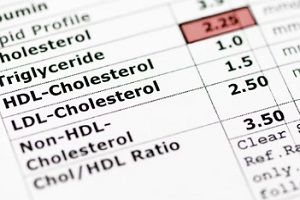[ad_1]
High triglycerides are increasingly common, but you can take control of your levels. Triglycerides are a fat necessary to the human body but at moderate levels. However, elevated triglycerides in your blood signal that you may have more triglycerides circulating than is healthy.
Over time, this can build up plaque in your arteries and raise your cardiovascular disease risk. The good news is that you can reduce high triglycerides through lifestyle measures and medication when necessary.
Understanding High Triglycerides
Triglycerides are a natural substance that your body produces and acquires from food. They play important roles, including providing energy and making hormones. Problems arise when you have chronically high concentrations in your bloodstream. This indicates impaired clearance of triglyceride-rich particles from your circulation.
Here is a breakdown of triglyceride levels:
- Normal: Below 150 mg/dL
- Borderline High: From 150 to 199 mg/dL
- High: From 200 to 499 mg/dL
- Very High: More than 500 mg/dL
Having high triglycerides typically does not cause symptoms, which makes screening regularly important. Unmanaged high levels may raise your risk for:
- Atherosclerosis
- Heart attack and stroke
- Pancreatitis
- Fatty liver disease
- Metabolic syndrome
Causes of High Triglycerides
A variety of lifestyle variables and medical issues can drive up triglycerides:
 Obesity: Too much body fat, especially in the abdominal region, releases more free fatty acids.
Obesity: Too much body fat, especially in the abdominal region, releases more free fatty acids.- Physical inactivity: Lack of exercise decreases triglyceride clearance.
- High sugar/refined carb diet: Spikes blood sugar and triglyceride production.
- Excess alcohol intake: Impairs triglyceride metabolism.
- Cigarette smoking: Increases circulating triglycerides.
- Underactive thyroid: Low thyroid hormone reduces triglyceride breakdown.
- Diabetes and prediabetes: Impairs blood sugar and lipid regulation.
- Kidney disease: Reduces triglyceride excretion.
- Some medications: Beta-blockers, estrogens, steroids, and similar drugs.
- Genetic factors: Carrying variants that increase triglyceride production.
As you can see, high triglycerides have many potential causes. Your doctor can do a full workup to help determine what is driving your elevated levels.
Lifestyle Changes to Lower High Triglycerides
Making healthy diet and lifestyle modifications should be your first-line treatment approach. Medications also play an important role, especially if levels are very high. However, lifestyle factors have a powerful triglyceride-lowering effect.
Exercise Regularly
Aim for 150 minutes, equivalent to 2.5 hours, per week of moderately intense exercise, such as walking briskly. This helps burn triglycerides for fuel and improves insulin sensitivity so your body can better metabolize triglycerides after meals.
Any movement, such as taking the stairs, parking farther away, or doing bodyweight exercises is beneficial. Build up to 30-60 minutes daily.
Lose Excess Weight
Carrying extra body fat directly contributes to high triglycerides by releasing more fatty acids into your circulation. Losing just 5-10% of your weight if overweight/obese can significantly lower levels. To shed pounds, create a modest calorie deficit through portion control and exercise. Reduce empty-calorie foods high in sugar and refined carbs.
Follow a Low Glycemic Diet
Eating sugary foods and refined carbohydrates such as white bread and sweetened beverages spikes blood sugar and signals your liver to produce more triglycerides.
Women should limit added sugar to a maximum of 24 grams, while men should not consume more than 36 grams daily. Focus on fiber-rich whole grains, fruits, vegetables, lean proteins, nuts, and healthy fats.
Limit Alcohol Intake
 Drinking too much impairs your liver’s ability to metabolize triglycerides. Have no more than one drink daily for women and two per day for men. Ideally, you should avoid alcohol altogether if your triglycerides are very high.
Drinking too much impairs your liver’s ability to metabolize triglycerides. Have no more than one drink daily for women and two per day for men. Ideally, you should avoid alcohol altogether if your triglycerides are very high.
Quit Smoking
Smoking induces your liver to produce extra triglyceride-rich particles and lowers HDL. Kicking the habit can quickly boost HDL and lower triglycerides.
Get Enough Sleep
Chronic sleep loss is linked to high triglycerides, likely due to hormonal changes that increase triglyceride production. Strive for 7-9 hours nightly. Having a bedtime routine, limiting screen use before bed, and making your room dark and cool can all improve sleep quality.
Manage Stress
Chronic stress and anxiety activate your body’s fight-or-flight response, releasing hormones that boost triglyceride production and circulation. Make daily relaxation a priority through practices such as meditation, yoga, deep breathing, nature time, and listening to music.
Medications for High Triglycerides
If lifestyle interventions do not lower your triglycerides enough, your doctor may prescribe medication. Common options include:
Statins
Statins such as atorvastatin and rosuvastatin are excellent at lowering LDL cholesterol. They have the additional benefit of lowering triglycerides by 15-30%, depending on the dosage. High-intensity statins tend to have greater triglyceride-lowering effects.
Omega-3 Fatty Acid Supplements
Both prescription and dietary omega-3 supplements containing EPA and DHA have been shown to reduce very high triglycerides, often by 20-50%.
Patients taking 4 grams daily of prescription Lovaza saw median triglyceride reductions of 45%. Dietary supplements did not perform as well in studies, so speak to your doctor.
Fibrates
Fibrates such as fenofibrate are particularly good at lowering triglycerides. They function by accelerating the breakdown of triglyceride-rich lipoproteins from your blood. Fibrates can reduce levels by 35-50% typically. They are often prescribed along with statins when triglycerides are severely high.
Niacin
Niacin (vitamin B3) hinders the liver’s production of triglyceride-rich VLDL particles. Studies show it can lower triglycerides by 20-50%. Due to side effects, niacin isn’t prescribed as much anymore, but it remains an effective option for some patients.
Get Your High Triglycerides Under Control with Imperial Center Family Medicine’s Support
 A multifaceted approach is best when tackling high triglycerides. Implement lifestyle steps diligently, and work with your doctor to determine if cholesterol or triglyceride-lowering medications may benefit you.
A multifaceted approach is best when tackling high triglycerides. Implement lifestyle steps diligently, and work with your doctor to determine if cholesterol or triglyceride-lowering medications may benefit you.
Medication paired with eating well, exercising, limiting alcohol, and managing stress can help restore triglycerides to a healthy range. If these lifestyle changes don’t seem to be working or you’re simply overwhelmed, Imperial Center Family Medicine is here to support you.
Our North Carolina healthcare experts have helped countless people get their high triglycerides under control. Contact us today at 919-873-4437 or online, and let us help you devise a personalized plan to get your triglycerides at a healthy level.
[ad_2]
Source link
